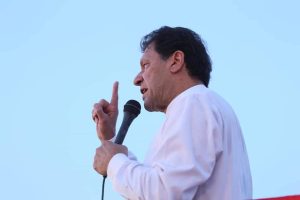Former Pakistani Prime Minister Imran Khan and his wife were sentenced on Wednesday to 14 years in prison each for corruption, his lawyer and prison officials said, a day after another special court convicted Khan of leaking state secrets and gave him a 10-year prison sentence.
The latest conviction and sentencing were Khan’s third since 2022, when he was ousted from power, and came ahead of Pakistan’s February 8 parliamentary elections. The sentences will be served concurrently.
Khan and his wife were accused in the most recent graft case of retaining and selling state gifts when he was in power. In Pakistan, government leaders are allowed to buy such gifts, but they aren’t usually then sold. If they are, individuals must declare the earnings as income. The prosecution said Khan did not correctly disclose his income after selling the gifts he had received from foreign dignitaries and heads of state.
The couple was also fined 787 million rupees ($2.8 million) each, and the court disqualified Khan for 10 years from holding any public office.
His lawyer, Babar Awan, said the former premier was convicted and sentenced in such a hurry that the judge did not wait for the arrival of his legal team. He said Khan’s basic human and fundamental rights had been violated, and that the latest legal setbacks would be challenged in higher courts. “It seems the judge was in a hurry to announce the verdict,” he said.
Zulfiqar Bukhari, the chief spokesperson for Khan’s Pakistan Tehreek-e-Insaf party, or PTI, also confirmed the conviction and sentencing.
In a statement, Bukhari said Khan’s conviction and sentencing was “another sad day in our judicial system history which is being dismantled.”
Khan and his wife, Bushra Bibi, were indicted three weeks ago on graft charges for retaining state gifts including jewelry and watches from Saudi Arabia’s government, authorities said. They pleaded not guilty.
Bibi was absent when the judge announced the verdict but later went to the court to avoid being arrested. She will be handed over to prison officials to serve her sentence.
Khan briefly attended Wednesday’s hearing but left the courtroom when the judge was about to read the verdict. He said he could not remain there without his lawyer and asked the judge to wait. His request was denied.
Awan, his lawyer, told The Associated Press that the former premier was being sidelined ahead of the vote next week, but noted that his party remains popular. Analysts say Khan enjoys a strong grassroots following.
Awan also said Khan’s trial was conducted against international and domestic laws.
Gohar Khan, the head of the PTI, said many people assumed Khan’s political career was over after this latest conviction. “No, this is not the case. He is not gone and I appeal to our supporters to vote for the candidates of PTI to ensure that we win the election, and this is the best way to avenge (him).”
Khan was ousted from power in a no-confidence vote in Parliament in April 2022. He is serving time on a corruption conviction and has multiple other legal cases hanging over him.
He remains popular despite his prison sentences and being out of the public eye since last August.
Pakistan has a history of arresting former prime ministers or sidelining them ahead of elections if they are deemed to pose a challenge to the security establishment. More than two-thirds of its civilian rulers have been arrested, convicted or disqualified since the country gained independence from Britain in 1947.
In 2018, three-time premier and Khan’s rival Nawaz Sharif was hobbled by legal cases and prison sentences. Khan’s party won the polls and formed a coalition government.
This time around, Sharif has a clear path to a fourth term in office after the Supreme Court acquitted him on all charges and scrapped a lifetime ban on politicians with criminal convictions from contesting elections.
Muhammad Ali, an Islamabad-based political analyst, said no former Pakistani premier has been convicted and sentenced in three cases within six months. But Ali said Khan was partly to blame because his legal team kept skipping court hearings as part of a strategy to delay the trial.

































